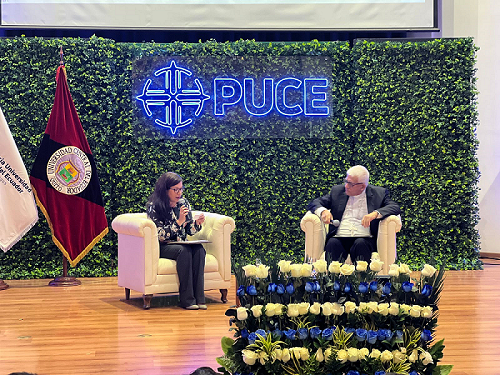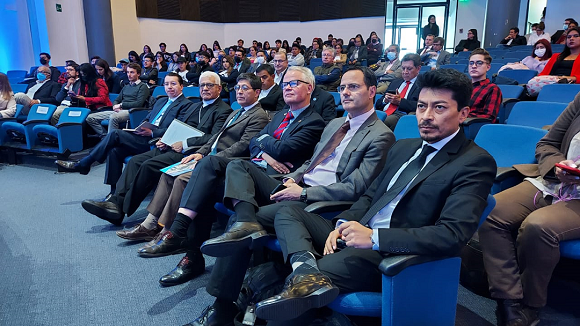The value of dialogue and the experiences of Latin America in peace processes, which the president of Celam addressed during the Seminar
International «Balance and perspectives of dialogue as an instrument to face social inequality»
Peace is a gift from God, but it is also a pastoral task, a missionary assignment, a challenge, a challenge that requires “that our hearts do not tremble or lose heart”; before the adversities of the continent
Building a lasting peace implies the habit of recognizing the other’s right to be himself and to be different
Peace is a gift from God, but it is also a pastoral task, a missionary assignment, a challenge, a challenge that requires “that our hearts do not tremble or lose heart”; before the adversities of the continent
Building a lasting peace implies the habit of recognizing the other’s right to be himself and to be different
A contribution from the Gospel, the Social Doctrine of the Church and the teachings of the last Popes, to move towards a multidisciplinary view of the peacebuilding; are some of the elements present in the intervention of Monsignor Miguel Cabrejos, president of the Latin American and Caribbean Episcopal Councilduring the International Seminar «Balance and perspectives of dialogue as an instrument to face social inequality». Event held this November 8 in Quito.
The prelate focused his dissertation on the value of dialogue and the experiences of Latin America in peace processeswithout departing from multidisciplinary character that it considers essential for the construction of peace and that it helps to overcome the risk of a biased or incomplete analysis that can seriously damage social peace and its prospects. This multidisciplinary perspective, affirms the bishop, allows a contribution to be made from the humanities, without which he maintains, the vision of life is incomplete.

the gift of peace
Taking as a starting point the greeting that Jesus entrusts to us when he sends us to build the Kingdom and that he himself teaches when we arrive anywhere, Monsignor Cabrejos extended his fraternal greetings to those present Peace be with you! Appreciating the invitation that becomes an opportunity to reflect on the importance of dialogue and peace in our contexts; the prelate explained that it is think about that gift that we receive from Jesus, but it is difficult to give it to others.
Evoking the phrase from the Gospel of Saint John “My peace I leave with you, my peace I give to you: I do not give to you as the world gives. Do not let your heart tremble or be cowardly” the prelate recalled that this allows us to understand that our peace is that which comes from Jesus and the ability to discern the signs of the times; placing ourselves in attentive listening to the Spirit, to grasp what God asks of us.
so he too president of the Peruvian episcopate, assured that it is necessary to understand that the peace of the Lord, which we receive as a gift, is also a pastoral task, a missionary task, a challenge, a challenge which necessarily requires “that our hearts not tremble or be dismayed”; Despite the latent adversities in the towns of Latin America and the Caribbean.
It is, in his opinion, humanize lifeas recent Popes have pointed out at various times. Saint John XXIII by affirming that the construction of peace has personal, community and global scope; or the Pope Francisco at Fratelli Tutti, even on closer days like the All Saints’ Dayremembering that, in order to be operators of peace, we have to “disarm the heart” and because If we do not welcome the gift of peace in our own hearts, it will be impossible to transmit it to others.
About, Monsignor Cabrejos He added that our mission as missionary disciples is to contribute to the construction of the Kingdom of God and its justice. understanding that justice is the foundation of peace.
“Without justice it is not possible to establish a sustainable and lasting peace, the peoples of Latin America and the Caribbean expect and trust that we walk synodically with them in recognition of their dignity and here we find a commitment that is generally the objective of dialogues by peace”. she declared.

reality and experiences
To understand the phenomenon Monsignor Miguel Cabrejos recalled that although Latin America and the Caribbean is a region of enormous wealth, it is also owner of the greatest social and economic inequalities; therefore, of many conflicts.
In this regard, he indicated that There is still no evidence of a sufficiently solid party systemcapable of sustaining democracy and the common good, so that practically in all cases of armed conflicts or subjugated peoples; the Church has been a refuge for the victims generating spaces for dialogue to advance in peace processes.
An example of this is the action of the Church in conflicts that have arisen in Mexico, Bolivia, Chile, Colombia, Guatemala, Honduras, El Salvador, Peru and Panama where The causes of conflicts are common and arise from political oppression, abuse of power, the violation of the rights of peasant, indigenous and Afro-descendant communities.
Faced with these situations, warns the Archbishop of Trujillo, the Church stands as mediator and guarantor of the rights of the communities,a strategic and prophetic role because most of the conflicts seek to get enough recognition to generate positive changes in social groups. For Monsignor Cabrejos, it is worth noting that in these processes the Church has been there to offer pastoral accompaniment to the people. The experiences made the countries learn that mediations between the actors of the conflict must be achieved with a moral authority enjoy reliability.
Being an impartial actor in conflicts, explains the prelate, the Church helps translate historic demands into workable agendas that can be discussed at dialogue tables, because many times States respond with solutions that the people did not want, which for the bishop implies that the Church take care of the methodological conditions in the mediating experience.
“Our Latin America and the Caribbean have lived for a long time in conditions of structural violence in many of their countries. This has led to generating political polarization and groups from different peoples opting for the path of violence, »she specified.
An analysis from the Church
Aware of the continental problems, the prelate said that the General Conferences of the Latin American and Caribbean Episcopate They have made a constant analysis of it that has been known in different pronouncements:
In Medellin, it was affirmed that the love of Christ, for the brothers who suffer, will not only be the great liberating force from injustice and oppression; but the inspiring source of social justice.
Puebla he assured that “everything that threatens the dignity of the human body, called to be the temple of God, implies profanation and sacrilege and saddens the Spirit”; this referring to murder and torture.
While Santo Domingo he insisted on the integral human promotion of the Latin American and Caribbean peoples; inviting promote a new economic, social and political order; much more in line with the dignity of people, promoting justice and solidarity, which in the end are the basis of peace.
Y Appeared raised at least three perspectives of violence referring to the need to become aware of the precarious situation that affects the dignity of many women, the inequalities in the sphere of work, politics and the economy, as well as the advertising exploitation by many media, which make women an object of profit.

listen and dialogue
Recognizing the dimensions of the problem, Monsignor Miguel Cabrejos mentioned the validity of mutual listening in the peace processes that supposes the mutual recognition of people, that is, the recognition of otherness,of the interlocutor who also has his own worldview, their own ways of understanding life and the transcendence in it.
“We must not forget that reaching the point of no return to the conflicts of political violence that shook our societies implies having clear public policies in the four components of the Truth Commission Agenda,” he stated.
In this sense, these forms of organization they must deal with the search for truth so that the victims achieve justice without the sense of revenge, ensuring reparation with public budgets, that must be applied in the painful cases of disappeared persons and forced displacement, among others; making sure they start reconciliation processes where the actors of the conflict can meet and heal the wounds; Only in this way can we think of a new form of coexistence that is based on listening and dialogue.
international systems
All of the above ensures Monsignor Cabrejos, constitutes a mission for the Church which, of course, takes refuge in the International Multilateral System which helps to generate spaces for justice and overcoming conflict and that requires public and financial investment to prevent them, addressing the causes of existing conflicts that generally, he points out, have their roots in poverty and inequality.
To achieve this there are certain elements that cannot be abandoned, among which are the ensure equity in its various dimensions, the participation of all the actors and the differentiation between the development agendas taking care of the articulations; defending and promoting human rights and ensuring accountability.
New paths, new ways of living
Finally, the president of Celam said that when we talk about build peace, We remember that it is a true craftsmanship that one must create meeting culture, as Pope Francis invites.
And some actions in this regard range from opening opportunities for the poor to be managers of viable economies in the short, medium and long term based on solidarity, the common good and good coexistence, to remembering that, together with the poor, the native peoples appear as claimants of the social responsibility of the Church. «Building justice and from there moving towards peace is a pastoral action for which it is necessary to join wills,» he claimed.
Build a lasting peace “implies the habit of recognizing the other’s right to be himself and to be different. From this recognition made culture, the gestation of a social pact becomes possible. Reaching both pacts, the cultural and the social, should be the objective of any peace process, which requires sincere and profound dialogue,” he concluded while imploring God to illuminate the process of building peace in our continent through the listening, discernment and dialogue with hope; so that with your effective help it becomes a reality.

We give you ‘Past, present and future of Opus Dei’
